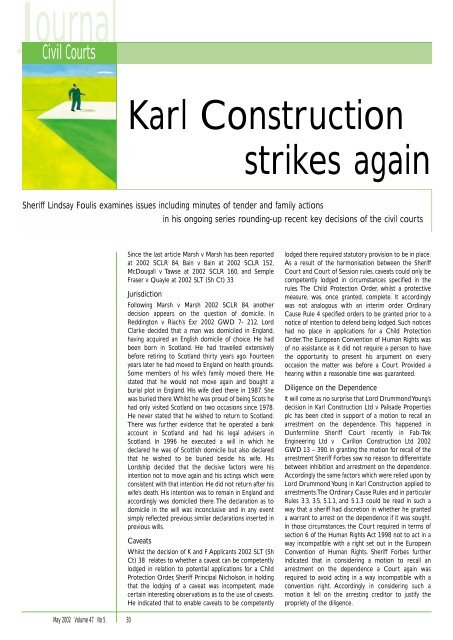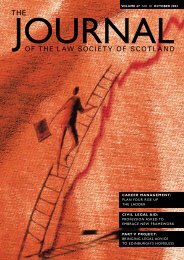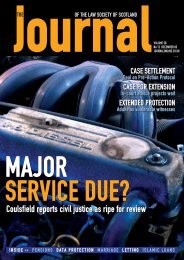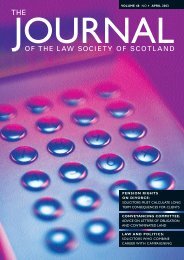OF THE LAW SOCIETY OF SCOTLAND - The Journal Online
OF THE LAW SOCIETY OF SCOTLAND - The Journal Online
OF THE LAW SOCIETY OF SCOTLAND - The Journal Online
You also want an ePaper? Increase the reach of your titles
YUMPU automatically turns print PDFs into web optimized ePapers that Google loves.
<strong>Journal</strong><br />
Civil Courts<br />
May 2002 Volume 47 No 5 30<br />
Karl Construction<br />
strikes again<br />
Sheriff Lindsay Foulis examines issues including minutes of tender and family actions<br />
in his ongoing series rounding-up recent key decisions of the civil courts<br />
Since the last article Marsh v Marsh has been reported<br />
at 2002 SCLR 84, Bain v Bain at 2002 SCLR 152,<br />
McDougall v Tawse at 2002 SCLR 160, and Semple<br />
Fraser v Quayle at 2002 SLT (Sh Ct) 33<br />
Jurisdiction<br />
Following Marsh v Marsh 2002 SCLR 84, another<br />
decision appears on the question of domicile. In<br />
Reddington v Riach’s Exr 2002 GWD 7- 212, Lord<br />
Clarke decided that a man was domiciled in England,<br />
having acquired an English domicile of choice. He had<br />
been born in Scotland. He had travelled extensively<br />
before retiring to Scotland thirty years ago. Fourteen<br />
years later he had moved to England on health grounds.<br />
Some members of his wife’s family moved there. He<br />
stated that he would not move again and bought a<br />
burial plot in England. His wife died there in 1987. She<br />
was buried there.Whilst he was proud of being Scots he<br />
had only visited Scotland on two occasions since 1978.<br />
He never stated that he wished to return to Scotland.<br />
<strong>The</strong>re was further evidence that he operated a bank<br />
account in Scotland and had his legal advisers in<br />
Scotland. In 1996 he executed a will in which he<br />
declared he was of Scottish domicile but also declared<br />
that he wished to be buried beside his wife. His<br />
Lordship decided that the decisive factors were his<br />
intention not to move again and his actings which were<br />
consistent with that intention. He did not return after his<br />
wife’s death. His intention was to remain in England and<br />
accordingly was domiciled there. <strong>The</strong> declaration as to<br />
domicile in the will was inconclusive and in any event<br />
simply reflected previous similar declarations inserted in<br />
previous wills.<br />
Caveats<br />
Whilst the decision of K and F Applicants 2002 SLT (Sh<br />
Ct) 38 relates to whether a caveat can be competently<br />
lodged in relation to potential applications for a Child<br />
Protection Order, Sheriff Principal Nicholson, in holding<br />
that the lodging of a caveat was incompetent, made<br />
certain interesting observations as to the use of caveats.<br />
He indicated that to enable caveats to be competently<br />
lodged there required statutory provision to be in place.<br />
As a result of the harmonisation between the Sheriff<br />
Court and Court of Session rules, caveats could only be<br />
competently lodged in circumstances specified in the<br />
rules. <strong>The</strong> Child Protection Order, whilst a protective<br />
measure, was, once granted, complete. It accordingly<br />
was not analogous with an interim order. Ordinary<br />
Cause Rule 4 specified orders to be granted prior to a<br />
notice of intention to defend being lodged. Such notices<br />
had no place in applications for a Child Protection<br />
Order.<strong>The</strong> European Convention of Human Rights was<br />
of no assistance as it did not require a person to have<br />
the opportunity to present his argument on every<br />
occasion the matter was before a Court. Provided a<br />
hearing within a reasonable time was guaranteed.<br />
Diligence on the Dependence<br />
It will come as no surprise that Lord Drummond Young’s<br />
decision in Karl Construction Ltd v Palisade Properties<br />
plc has been cited in support of a motion to recall an<br />
arrestment on the dependence. This happened in<br />
Dunfermline Sheriff Court recently in Fab-Tek<br />
Engineering Ltd v Carillon Construction Ltd 2002<br />
GWD 13 – 390. In granting the motion for recall of the<br />
arrestment Sheriff Forbes saw no reason to differentiate<br />
between inhibition and arrestment on the dependence.<br />
Accordingly the same factors which were relied upon by<br />
Lord Drummond Young in Karl Construction applied to<br />
arrestments.<strong>The</strong> Ordinary Cause Rules and in particular<br />
Rules 3.3, 3.5, 5.1.1, and 5.1.3 could be read in such a<br />
way that a sheriff had discretion in whether he granted<br />
a warrant to arrest on the dependence if it was sought.<br />
In those circumstances, the Court required in terms of<br />
section 6 of the Human Rights Act 1998 not to act in a<br />
way incompatible with a right set out in the European<br />
Convention of Human Rights. Sheriff Forbes further<br />
indicated that in considering a motion to recall an<br />
arrestment on the dependence a Court again was<br />
required to avoid acting in a way incompatible with a<br />
convention right. Accordingly in considering such a<br />
motion it fell on the arresting creditor to justify the<br />
propriety of the diligence.










